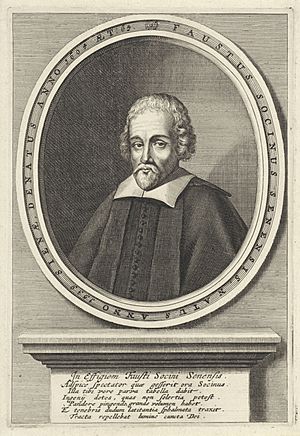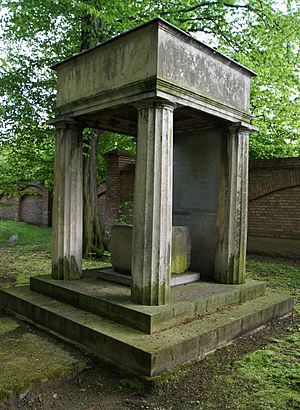Fausto Sozzini facts for kids
Quick facts for kids
Fausto Sozzini
|
|
|---|---|

|
|
| Born |
Fausto Paolo Sozzini
5 December 1539 Siena, Republic of Siena in the Holy Roman Empire
|
| Died | 4 March 1604 (aged 64) Lusławice, Crown of the Kingdom of Poland in the Polish–Lithuanian Commonwealth
|
|
Notable work
|
Explicatio primae partis primi capitis Evangelistae Johannis (1563), Disputatio de Jesu Christo servatore (1578), De sacrae Scripturae auctoritate (1580s), De statu primi hominis ante lapsum disputatio (1610) |
| Theological work | |
| Language | Italian, New Latin |
| Tradition or movement | Socinianism |
| Notable ideas | Denial of divine foreknowledge regarding the actions of free agents, Rejection of the pre-existence of Christ |
|
Fausto Sozzini
|
|
|---|---|
| Era | Protestant Reformation Radical Reformation |
|
Main interests
|
Nontrinitarian Christian theology |
|
Influences
|
|
|
Influenced
|
|
Fausto Sozzini (born 5 December 1539 – died 4 March 1604) was an important Italian thinker and theologian. He helped start a Christian belief system called Socinianism. This movement did not believe in the traditional idea of the Trinity (God as Father, Son, and Holy Spirit).
Fausto worked with his uncle, Lelio Sozzini, to develop these ideas. Their teachings became popular among groups like the Polish Brethren and the Unitarian Church of Transylvania in the 16th and 17th centuries. Fausto gathered many of his uncle's writings and organized them into a clear set of beliefs. His book, De sacrae Scripturae auctoritate, was very important. It helped people see the Bible as historical texts.
Contents
Fausto Sozzini's Early Life
Fausto Sozzini was born in Siena, a city in what is now Italy. At that time, Siena was part of the Holy Roman Empire. He was the only son of Alessandro Sozzini and Agnese Petrucci. His father died when Fausto was very young, in 1541.
Fausto did not go to a regular school. He was taught at home with his sister, Fillide. He spent his youth reading many books at his family's country home. His family, especially the women, taught him strong moral values. His uncle, Celso Sozzini, helped him start thinking deeply. Celso was a Roman Catholic but also a free thinker. He started a short-lived group called the Accademia del Sizienti, which Fausto joined.
Becoming Independent
In 1556, Fausto's grandfather, Mariano Sozzini the younger, left him a large part of the family's wealth. This made Fausto financially independent. The next year, he joined the Accademia degli Intronati in Siena. This was a place where intellectuals met and discussed ideas. Fausto was known for his talent and was expected to have a career in law. However, he preferred writing sonnets (poems).
Around 1558–1559, Fausto and his uncles Celso and Camillo were suspected of following Lutheranism. This was a new Protestant movement.
Moving to France and Switzerland
When Fausto turned 21 in 1561, he moved to Lyon, France. He likely worked in trade there. After his uncle Lelio Sozzini died, Fausto visited Italy again. In 1562, he was listed as a member of the Italian church in Geneva, Switzerland. However, he did not seem to have close ties with John Calvin, a famous Protestant leader. He returned to Lyon the next year.
Fausto's religious views were quite radical. In his early writings, he already questioned the traditional idea of Christ's divine nature. He believed Christ's divinity came from his role, not from his very being. He also believed that the immortality of the soul was not true. Instead, he thought that people "slept" until a future resurrection.
Time in Florence
Near the end of 1563, Fausto went back to Italy. He outwardly followed the Roman Catholic Church again. For 12 years, he worked for Isabella de Medici, the daughter of the Grand Duke of Tuscany. He later felt this time was wasted. During this period, he wrote his important book, De auctoritate s. scripturae.
In 1571, he was in Rome, probably with Isabella. He left Italy in late 1575. After Isabella died in 1576, her brother Francesco, the new grand-duke, asked Fausto to return. But Fausto refused. It is believed that Fausto left Italy because of his religious beliefs. The grand-duke may have agreed to let Fausto keep his property income as long as he did not publish his ideas under his own name.
Studying in Basel
Fausto then settled in Basel, Switzerland. He spent his time deeply studying the Bible. He even started translating the Psalms into Italian poetry. Despite becoming increasingly deaf, he became a central figure in theological discussions. His debates led him to write De Jesu Christo servatore (finished in 1578). This book made him known to Giorgio Biandrata, a doctor and influential religious figure in Poland and Transylvania.
Journey to Transylvania
Transylvania had a period of religious freedom. However, the ruler, Christopher Báthory, favored the Jesuits. Biandrata wanted to limit the influence of Ferenc Dávid, an anti-Trinitarian bishop who had stopped worshipping Christ. Biandrata asked Sozzini to talk with Dávid.
Sozzini believed that Christians must show respect to Christ, but direct prayer to Christ was optional. In November 1578, Sozzini arrived in Kolozsvár (now Cluj-Napoca) from Poland. He stayed with Dávid for over four months, trying to convince him to accept his view on worshipping Christ. However, Dávid strongly preached against any worship of Christ.
Dávid was then put on trial for his new ideas. Sozzini quickly returned to Poland before the trial began. Sozzini was not involved in Dávid's imprisonment, where Dávid died. Sozzini believed Dávid should stop preaching until a larger church meeting could decide the matter.
Life in Poland
The rest of Fausto Sozzini's life (1579–1604) was spent in Poland. At first, he was not fully accepted by the anti-Trinitarian church there because of his views on baptism. He believed baptism was only for people converting from non-Christian faiths. However, he gradually gained great influence in their meetings.
The Polish Brethren asked him to defend their views on conscientious objection (refusing to participate in war or violence). He became a respected leader among them. Fausto Sozzini convinced many in the anti-Trinitarian church to change their beliefs. He moved them away from the idea that Christ existed before he was born. He also influenced the anti-Trinitarian church in Transylvania through his letters.
In 1583, Fausto was forced to leave Kraków. He found a home with a Polish nobleman, Christopher Morsztyn. In 1586, Fausto married Christopher's daughter, Elizabeth. She died the next year, shortly after their daughter Agnese was born. Agnese later married Stanisław Wiszowaty and had many descendants.
In 1587, the grand-duke Francesco died. This led to Fausto losing his property in Italy. Family disagreements about his grandfather's will also arose. In 1590, the Inquisition in Siena officially disinherited him, though they offered a pension that was never paid.
Since he no longer received money from Italy, the agreement to keep his writings anonymous ended. Sozzini began to publish his works under his own name. As a result, in 1598, a mob attacked him in Kraków. They destroyed his house and beat him. Friends welcomed him at Luslawice, about 30 miles east of Kraków. He had been ill for a long time and died there on 4 March 1604. A stone marks his grave, but the writing is hard to read.
Fausto Sozzini's Important Works
Fausto Sozzini's writings were collected and published in two large books in 1668. These books are considered the first two volumes of the Bibliotheca fratrum polonorum (Library of the Polish Brethren). They contain all of his surviving theological works.
Sozzini believed his best work was Contra atheos, which was destroyed in the riot in Kraków in 1598. He also started other works to explain his entire system of beliefs, but he never finished them.
His most important works are De auctoritate scripturae sacrae (1570) and De Jesu Christo servatore (1578). The first book was published in 1588. It discusses how the Christian religion can be proven true. The second book, about the Savior, was very important for theology. It showed how his new ideas were different from traditional Christian beliefs.
Sozzini did not want to be seen as the leader of a new religious group. He wanted to simplify the main ideas of Christianity. A memorial in Siena describes him as someone who defended human reason against supernatural ideas.
Beyond theology, Sozzini also believed that war and taking human life were wrong in any situation. This led him to suggest milder punishments for religious and anti-religious offenders. He also thought that Christians should not hold government positions.
See also
 In Spanish: Fausto Socino para niños
In Spanish: Fausto Socino para niños


